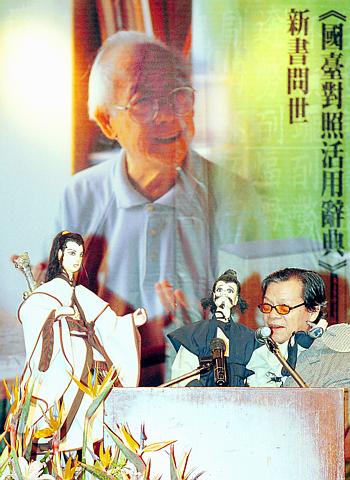After 22 years of research, Professor Wu Shou-li (吳守禮), a 92-year-old lexicographer, has completed his 2,863-page Practical Mandarin-Taiwanese Dictionary (國台對照活用辭典), which was presented to the public yesterday at National Taiwan University (NTU).
Professor Tung Chung-si (
"Since the Taiwanese-Japanese Dictionary (台日大辭典) which was published in 1932, there has been no single work that matches the meticulous attention to detail that Wu has provided with his new dictionary," Tung said.

PHOTO: CHIANG YING-YING, TAIPEI TIMES
Released by Yuan-Liou Publishing Company (
Wu was a well-known professor of Mandarin at National Taiwan University (NTU). He started working on the dictionary after his retirement from the university.
Wu's approach to the pronunciation of Taiwanese was to use the National Phonetic Symbols for Mandarin (
Using this system, Wu has solved the predicament of Taiwanese writers who are unsure how to represent spoken Taiwanese in written form.
DPP lawmaker Wang To (王拓), the host of the event, praised Wu's dedication. "Many people do not know which characters to use to represent the sounds of Taiwanese. Wu has solved the problem for all those who wish to write in Taiwanese," Wang said.
The system allows everybody who knows bopomofo -- the basic building blocks of Chinese literacy skills in Taiwan -- to learn the pronunciation of Taiwanese easily.
Minister of Education Ovid Tzeng (
Wu said that yesterday was "the most glorious day of my life."
In 1988 a fire destroyed much of his research for the project but did not extinguish his desire to finish the work.
After the fire, Wu carefully gathered what remained and resumed work on the dictionary with the help of his daughters.
Wu has studied Japanese, Mandarin, Taiwanese, English, German, and many other languages throughout his life. His decision to concentrate on Taiwanese after World War II and his unprecedented achievements have won him praise from President Chen Shui-bian (
"Language is a cultural bridge. I am grateful that Professor Wu chose his mother tongue as the core of his studies. His contributions to the Taiwanese language and the culture of Taiwan are beyond acclaim," Chen said. He also said he hoped that one day a book could be written in Taiwanese that would rank on the world stage with such masters as Dante and Goethe.
"The most famous stories in the world are told in their authors' mother tongues. Dante wrote The Divine Comedy in Italian. Goethe wrote The Sorrows of Young Werther in German. Hopefully one day there will be a world-famous story about Taiwan that is written in Taiwanese," Chen said.

BUILDUP: US General Dan Caine said Chinese military maneuvers are not routine exercises, but instead are ‘rehearsals for a forced unification’ with Taiwan China poses an increasingly aggressive threat to the US and deterring Beijing is the Pentagon’s top regional priority amid its rapid military buildup and invasion drills near Taiwan, US Secretary of Defense Pete Hegseth said on Tuesday. “Our pacing threat is communist China,” Hegseth told the US House of Representatives Appropriations Subcommittee on Defense during an oversight hearing with US General Dan Caine, chairman of the Joint Chiefs of Staff. “Beijing is preparing for war in the Indo-Pacific as part of its broader strategy to dominate that region and then the world,” Hegseth said, adding that if it succeeds, it could derail

CHIP WAR: The new restrictions are expected to cut off China’s access to Taiwan’s technologies, materials and equipment essential to building AI semiconductors Taiwan has blacklisted Huawei Technologies Co (華為) and Semiconductor Manufacturing International Corp (SMIC, 中芯), dealing another major blow to the two companies spearheading China’s efforts to develop cutting-edge artificial intelligence (AI) chip technologies. The Ministry of Economic Affairs’ International Trade Administration has included Huawei, SMIC and several of their subsidiaries in an update of its so-called strategic high-tech commodities entity list, the latest version on its Web site showed on Saturday. It did not publicly announce the change. Other entities on the list include organizations such as the Taliban and al-Qaeda, as well as companies in China, Iran and elsewhere. Local companies need

CROSS-STRAIT: The MAC said it barred the Chinese officials from attending an event, because they failed to provide guarantees that Taiwan would be treated with respect The Mainland Affairs Council (MAC) on Friday night defended its decision to bar Chinese officials and tourism representatives from attending a tourism event in Taipei next month, citing the unsafe conditions for Taiwanese in China. The Taipei International Summer Travel Expo, organized by the Taiwan Tourism Exchange Association, is to run from July 18 to 21. China’s Taiwan Affairs Office spokeswoman Zhu Fenglian (朱鳳蓮) on Friday said that representatives from China’s travel industry were excluded from the expo. The Democratic Progressive Party government is obstructing cross-strait tourism exchange in a vain attempt to ignore the mainstream support for peaceful development

ELITE UNIT: President William Lai yesterday praised the National Police Agency’s Special Operations Group after watching it go through assault training and hostage rescue drills The US Navy regularly conducts global war games to develop deterrence strategies against a potential Chinese invasion of Taiwan, aimed at making the nation “a very difficult target to take,” US Acting Chief of Naval Operations James Kilby said on Wednesday. Testifying before the US House of Representatives Armed Services Committee, Kilby said the navy has studied the issue extensively, including routine simulations at the Naval War College. The navy is focused on five key areas: long-range strike capabilities; countering China’s command, control, communications, computers, cyber, intelligence, surveillance, reconnaissance and targeting; terminal ship defense; contested logistics; and nontraditional maritime denial tactics, Kilby